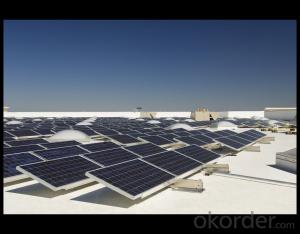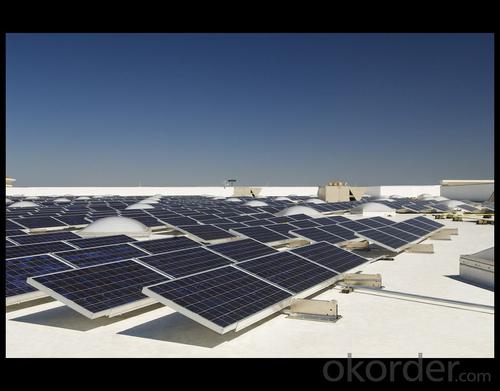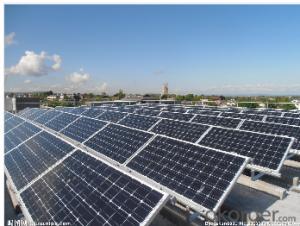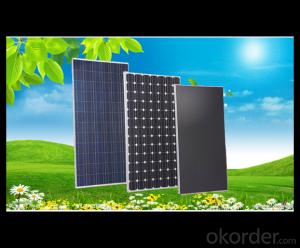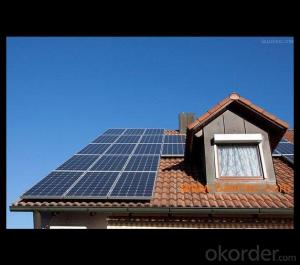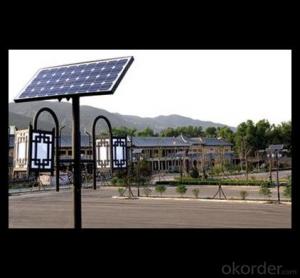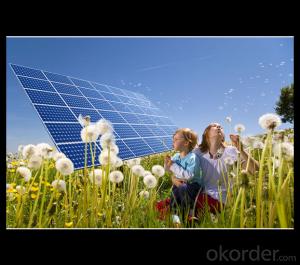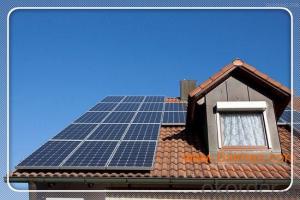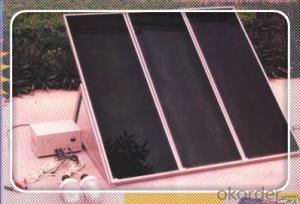Solar Panels for Sale Amazon - 320W Direct Factory Sale Price 260-320Watt Solar Panels
- Loading Port:
- China main port
- Payment Terms:
- TT OR LC
- Min Order Qty:
- 10000 watt
- Supply Capability:
- 100000 watt/month
OKorder Service Pledge
OKorder Financial Service
You Might Also Like
Specification
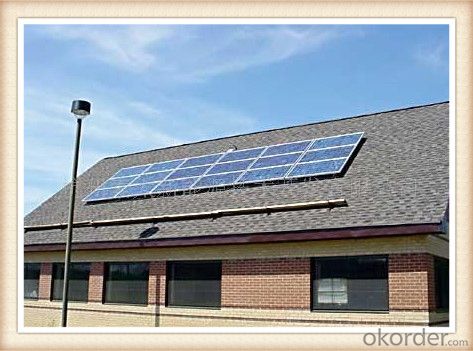
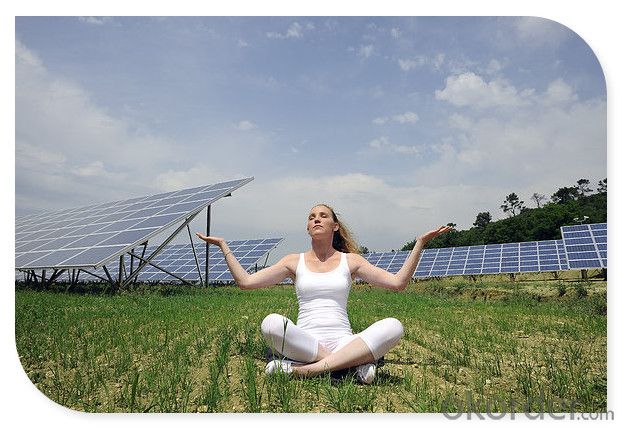
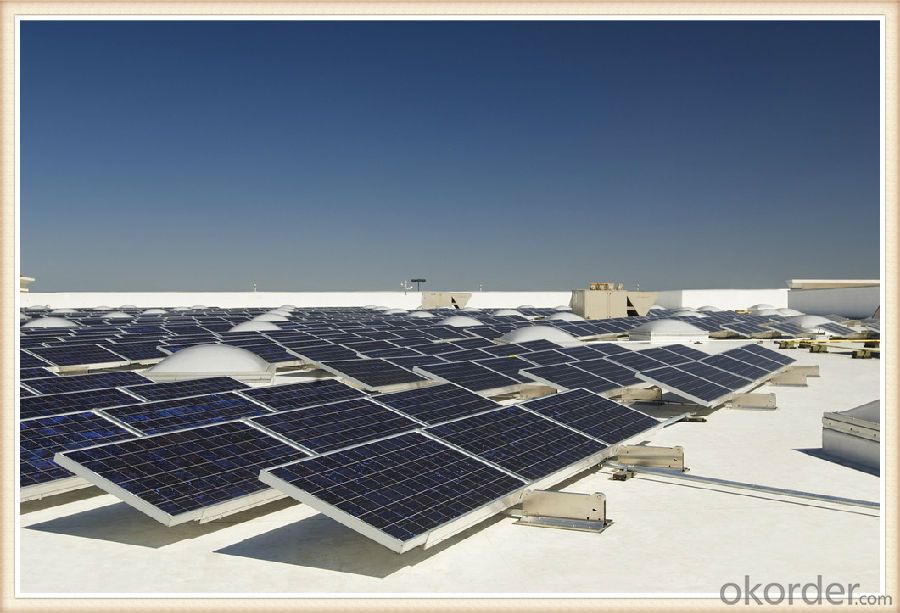
Solar Module Introduction
Solar modules use light energy (photons) from the sun to generate electricity through the photovoltaic effect. The majority of modules use wafer-based crystalline silicon cells or thin-film cells based on cadmium telluride or silicon. The structural (load carrying) member of a module can either be the top layer or the back layer. Cells must also be protected from mechanical damage and moisture. Most solar modules are rigid, but semi-flexible ones are available, based on thin-film cells. These early solar modules were first used in space in 1958.
Electrical connections are made in series to achieve a desired output voltage and/or in parallel to provide a desired current capability. The conducting wires that take the current off the modules may contain silver, copper or other non-magnetic conductive transition metals. The cells must be connected electrically to one another and to the rest of the system. Externally, popular terrestrial usage photovoltaic modules use MC3 (older) or MC4 connectors to facilitate easy weatherproof connections to the rest of the system.
Specification
Model Type | |
Peak Power-Pmax(W) | 5-200W |
Open Circuit Voltage-Voc(V) | 44.2 |
Maximum Power Voltage-Vmp(V) | 36 |
Short Circuit Current-Isc(A) | 5.4 |
Maximum Power Current-Imp(A) | 5 |
Maximum System Voltage | 1000V DC |
Maximum Series Fuse Rating | 10A |
Power Tolerance | -1~+3% |
Temperature Coefficients of Pmax | -0.45%/℃ |
Temperature Coefficients of Voc | -0.348%/℃ |
Temperature Coefficients of Isc | 0.031%/℃ |
Nominal Operating Cell Temperature | 44.5±2℃ |
Standard Testing Condition(STC) | Irradiance:1000W/m²;Temperature:25℃;AM=1.5 |
Qualification Test Parameters | |
Operating Temperature | -40℃~+85℃ |
Storage Temperature | -40℃~+85℃ |
Pressure Bearing | ≥5400Pascal/m² |
Wind Bearing | ≥5400Pascal/m² |
Mechanical Characteristics | |
Cell Size | Mono 125*125mm±0.5 |
No.of Cells | 72pcs(6*12) |
Dimension | 1580*808*40mm |
Weight | 15.5Kg |
Glass | 3.2mm High Transmission,Low Iron |
Frame | Anodized Aluminum Alloy |
Junction Box | IP65Rated |
Internal Diodes | 3 Bypass Diodes |
Cable | 1*4.0mm² Length 900mm |
Images
Packing & Shipping:
We have rich experience on how to pack the panels to make sure the safety on shipment when it arrives at the destination.
The normal size is packed by 25pcs/ carton / pallet. Paper carton for FCL shipping and wood carton for LCL shipping.
Features
1.High reliability with guaranteed -3% to +5% power output tolerance, ensuring return on investment
2.High conversion efficiency based on leading innovative photovoltaic technologies
3.Withstands high wind-pressure and snow load, and extreme temperature variations
4.Attractive appearanceUnique frame design, high mechanical strength, and easy Installation
Warranty:
For c-Si panel: 25years output warranty for no less than 80% of performance, 10 years output warranty for no less than 90% of performance. Free from material and workmanship defects within 5 years.
For a-Si panel: 20 years output warranty for no less than 80% of performance, 10 years output warranty for no less than 90% of performance. Free from material and workmanship defects within 2 years.
•100% product quality protection
•100% on-time shipment protection
•100% payment protection for your covered amount
FAQ:
(1)What price for each watt?
It depends on the quantity, delivery date and payment terms.
(2)What is your size for each module? Can you tell me the Parameter of your module?
We have different series of panels in different output, both c-Si and a-Si. Please take the specification sheet for your reference.
(3)Can you provide the peripheral products of the solar panels, such as the battery, controller, and inverter? If so, can you tell me how do they match each other?
Actually we are only manufacturer of solar panels, but we could try to source them for you in China if you need. We could provide you an optimal system design to instruct you how to install.
(4)Do you have the CE, TUV, UL Certification?
We’ve already passed all the tests, and any certificate is available.
(5)Have you ever sold your products to companies in my country?
Of course, we have customers in all general PV markets, but I think we should expand our market share along with the market growth.
(6)When did your company set up? You are a new company, how can I believe your quality?
We entered into Solar PV industry in 2005, now we have several plants in manufacturing of a-Si and c-Si panels, and our capacity is 220MW per year. Till now we have already passed all the tests by authorized laboratories, e.g. TUV, VDE, UL.
(7)Can you help us install the module if we cooperate with you?
We haven’t entered into installation sector, but we have the plan in near future.
(8) How do you pack your products?
We have rich experience on how to pack the panels to make sure the safety on shipment when it arrives at the destination.
(9) Can you do OEM for us?
Yes, we can.
(10)Can we visit your factory?
Surely, I will arrange the trip basing on your business schedule.
- Q: Does the new horizons has a solar panel for it power resources instead using nuclear generator?
- No solar panel, and for the reason you stated - it is so far from the Sun that a solar panel would be of little use (and a lot of extra weight) at the distances where the primary part of the mission was being performed. The power source is called an RTG. We can think of it as similar to a nuclear-powered battery or a miniature nuclear power plant. As far as I know it is not intended to reach any other star. If it does, it's power will have long since depleted - and it would take thousands of years at its current speed to reach even the closest star. Closest star: Proxima Centauri, slightly more than 4 light years away. Current speed of New Horizons relative to the Sun: 4.52 km/s That's 0.000048 of the speed of light. It would take more than 20,000 years to reach Proxima Centauri *if* it were heading in that direction (which it is not).
- Q: How do solar panels affect the property's operating costs?
- Solar panels can significantly reduce a property's operating costs by generating clean and renewable energy, thereby reducing or even eliminating the need for traditional electricity from the grid. This results in lower monthly utility bills, as well as potential incentives such as net metering or feed-in tariffs that allow excess energy to be sold back to the grid. Additionally, solar panels require minimal maintenance and have a long lifespan, further contributing to cost savings over time.
- Q: all i want to do is provide enough electricity for 2 fluorescent bulbs i was looking at some 80 watt panels how many of those would i need and what else do i need for storing the electricity for use at nite? and how much would it all cost?
- The solar panels are made in China because there are fewer environmental regulations and cheap coal power. It takes a lot of energy to melt silicon and there are toxic waste products. It would be three to five times more expensive to make the panels in the US ( three times is just for reprocessing the toxic wastes ). Solar cell made in China are about $2 a watt, perhaps as low as $ a watt but in truth the claims for $ a watt or less solar panels as in thin film solar panels have much lower efficiency and require perhaps ten times more surface area.
- Q: I need to prepare solar panels for using in home needs electricity purpose. Can anyone could help me to know much more about it.
- It's possible to make a DIY homemade solar or wind power turbine to power your home, house, water pump, irrigation system and much more. You don't need to buy expensive wind turbine generator equipment. Trust me these wind power generator equipment cost so much that you could spend years saving to buy a very small unit. I live in a very windy and remote area in Kenya; Africa where it might be another 3 decades before the national power grid finally gets to our horizon. I was about to buy such equipment when I stumbled on a do it yourself manual online that had colorful illustrations of how to make a homemade wind turbine for as low as $200. Compare this to a small turbine unit that goes for no less than $ 3000 and you see what I mean when I say you are better off making one at home.
- Q: This is for my science project and i cannot figure it outWe assumed that blue light shining on a solar panel would give off the higher volt reading because it has the shortest wavelength and the highest energy, but it was actually the lowest. Why does this happen? Im very confused And cant find the answer anywhere.... ,thank you!!
- Surely the highest volt reading will result from the wave with the largest amplitude, wavelength irrespective? You'd need to know the amplitude of the wave AFTER leaving the colour filter, since different chemicals and pigments in the filter would naturally affect the resulting wave in different ways.
- Q: how to use a motor with solar panel
- You need a battery, no solar panel is strong enough to move any significant motor
- Q: I am intrested in buying solar panels to save a buck and even maek some money off of it but I was wondering what kind? How Much? How Many? Are they easy to install? Whats the best brand? I want alot of information on this if anyone can give me some help on it in a user friendly way it would be appreciated!
- If okorder and search for solar panels, they list companies that sell solar panels and you can compare prices there.
- Q: How much electricity can a solar panel generate?
- The amount of electricity a solar panel can generate depends on several factors such as the size and efficiency of the panel, the amount of sunlight it receives, and any shading or obstructions. On average, a typical solar panel can generate between 250 to 400 watts of electricity per hour.
- Q: I want to replace my electricity with solar and wind. I live just right outside the city, the roof about 000 square feet. How many windmills/solar panels would it take to get me off the power grid?
- I live in the Southwest where the sun shines almost every day. I got a quote for Solar system to produce about enough to cover my annual usage. My annual average electrical usage costs about $2300, or about $90/MO. The system costs around $30,000 but I can get rebates and some of your tax dollars in subsidies to bring my cost down to under $20,000. I can borrow $20,000 for 3 years at 7% and pay $95/MO, so in 3 years I will have the system paid for. As you can see, I don't start Saving any money for a long time. Maybe the rates will go up in later years which will help, but My friends that have solar systems tell me things like controllers go bad over time and they cost like $3000. Will it ever pay for itself? Maybe. Please note. This still does not get me off the grid. This system will not support things like an electric stove, air conditioning, Pool pump running, etc. so I still need the grid for when these operate and my usage peaks. If I installed a system that would totally support everything 24/7 the cost would be astronomical. If you live in the east, midwest, or NW where you have cloudy days, your economic calculations will be much less favorable I would think, unless your power costs are much higher than mine..
- Q: how to build a solar panel
- Build okorder
Send your message to us
Solar Panels for Sale Amazon - 320W Direct Factory Sale Price 260-320Watt Solar Panels
- Loading Port:
- China main port
- Payment Terms:
- TT OR LC
- Min Order Qty:
- 10000 watt
- Supply Capability:
- 100000 watt/month
OKorder Service Pledge
OKorder Financial Service
Similar products
Hot products
Hot Searches
